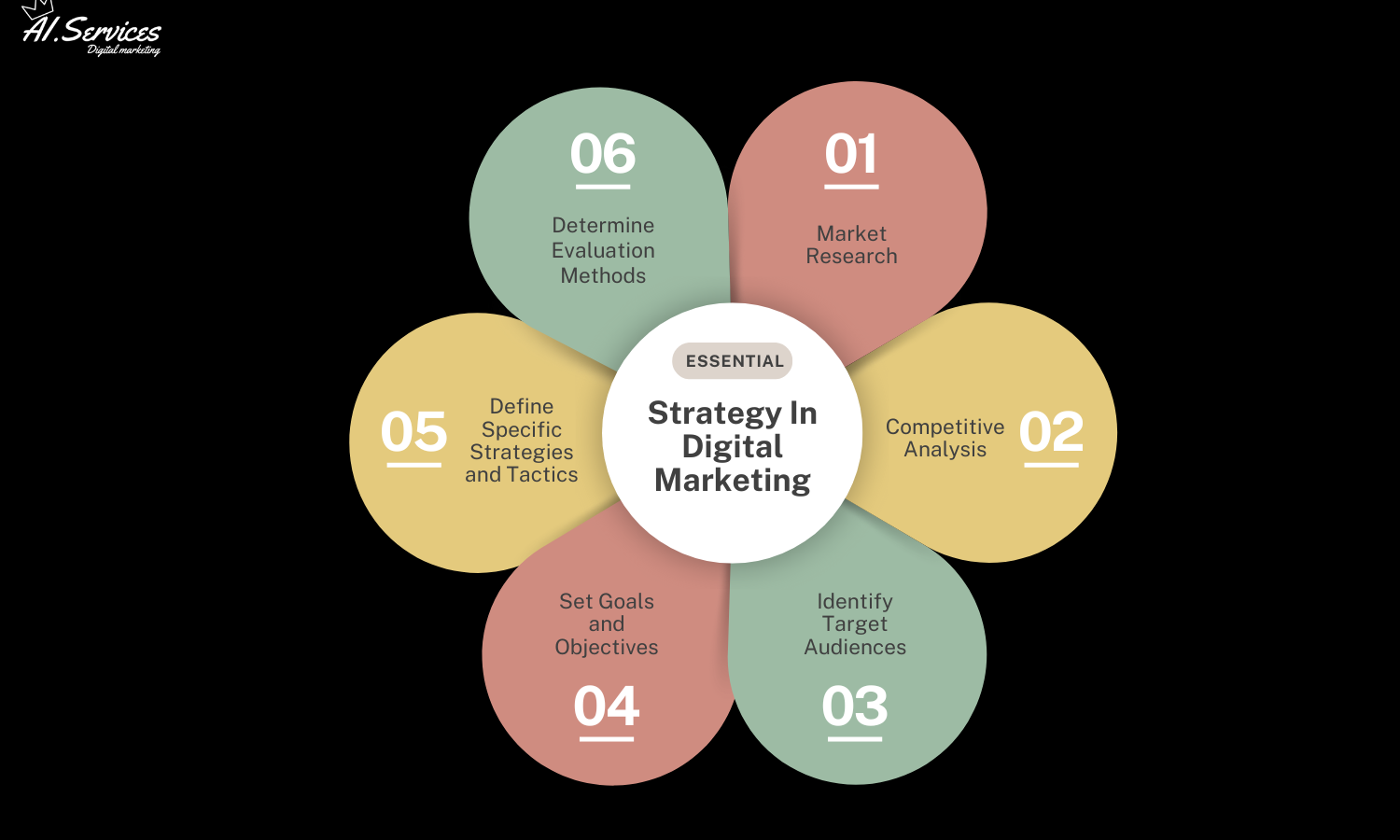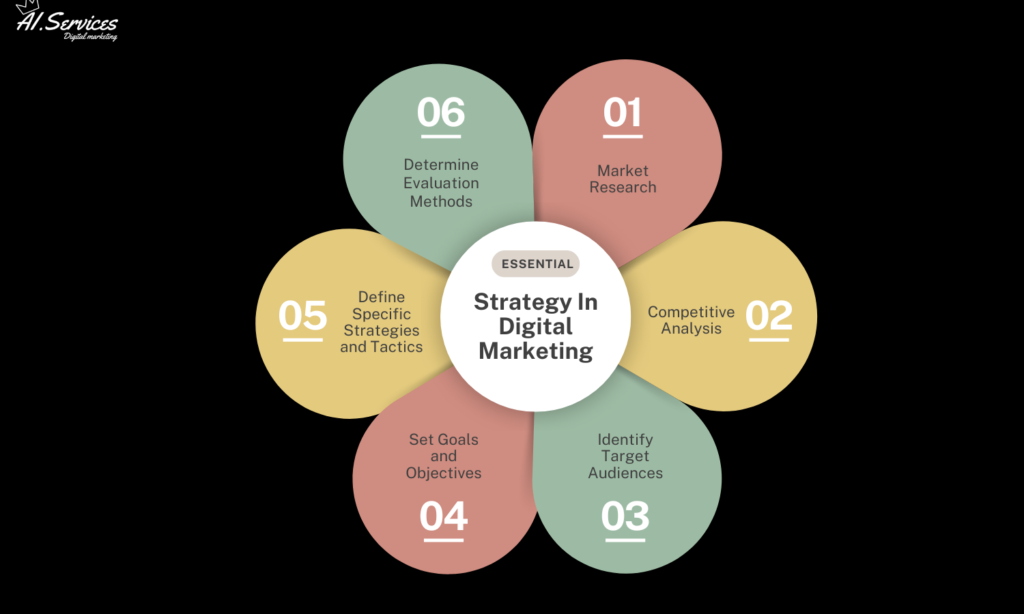
Are you struggling to create a winning strategy in the ever-evolving digital marketing landscape? Look no further than ‘This 10 Essential Marketing Tips on Understanding Winning Strategy in Digital Marketing.’ In this comprehensive guide, I will delve into 10 Essential strategy and tactics that will help you stay ahead of the curve and achieve your marketing goals.
Whether you’re a seasoned digital marketer looking to refine your strategy or a beginner aiming to establish a strong online presence for your Brand, this guide has got you covered. From understanding your target audience and setting SMART goals to implementing effective SEO techniques and leveraging the power of social media, you’ll discover the invaluable insights and practical tips needed to maximize your digital marketing efforts.
Bringing together the latest industry research and best practices, this guide combines expert advice with actionable steps, ensuring that you can confidently navigate the world of digital marketing and achieve success. Don’t miss out on this must-have resource for marketers of all levels. Get ready to take your digital marketing strategy to new heights with these 10 Essential Marketing Tips in ‘Understanding Winning Strategy in Digital Marketing.’
Understanding Digital Marketing
Digital marketing encompasses a wide range of online tactics and strategies aimed at reaching and engaging with your target audience through various digital channels. Unlike traditional marketing, digital marketing allows you to perform targeted and personalized approaches, making it a highly effective tool for businesses looking to connect with their customers in a meaningful way. Understanding the fundamentals of digital marketing is the first step towards creating a successful strategy that resonates with your audience and drives conversions.
In today’s digital age, consumers are constantly bombarded with information and advertisements. To cut through the noise and capture the attention of your target audience, you need to have a solid understanding of how digital marketing works and the different channels and techniques available to you. From search engine optimization (SEO) and social media marketing to email campaigns and content creation, digital marketing offers a plethora of avenues for businesses to connect with their customers and drive engagement.
Why a Winning Strategy is Important in Digital Marketing
A winning digital marketing strategy is like a roadmap that guides your online efforts towards achieving specific goals and objectives. Without a well-defined strategy in place, you risk wasting time and resources on ineffective tactics that do not contribute to your overall business objectives. By crafting a winning strategy, you can align your digital marketing efforts with your business goals, ensuring that every campaign and initiative is geared towards driving measurable results and maximizing your return on investment.
In today’s competitive digital landscape, having a strategy that sets you apart from the competition is more important than ever. A well-crafted digital marketing strategy do not only helps you reach your target audience more effectively but also enables you to build brand awareness, drive customer loyalty, and ultimately increase sales and revenue. By investing time and effort into developing a winning strategy, you can position your business for long-term success and growth in the digital realm.
The Key Elements of a Winning Digital Marketing Strategy
Crafting a winning digital marketing strategy requires a deep understanding of your business objectives, target audience, and the competitive landscape in which you operate. By focusing on key elements such as market research, target audience definition, goal setting, channel selection, content creation, campaign implementation, and performance tracking, you can create a comprehensive strategy that drives results and delivers a strong return on investment.
Market research is the foundation of any successful digital marketing strategy. By analyzing market trends, customer behavior, and competitor strategies, you can gain valuable insights that inform your own approach and help you identify opportunities for growth and differentiation. Understanding your target audience is equally important, as it allows you to tailor your messaging and content to resonate with the specific needs and preferences of your customers.
Setting clear and measurable goals is essential for evaluating the success of your digital marketing efforts. Whether your goal is to increase website traffic, generate leads, or boost sales, having specific metrics in place allows you to track your progress and make informed decisions about future campaigns. Choosing the right channels and tactics for your digital marketing campaigns is also crucial, as it determines how and where you engage with your audience to achieve the desired outcomes.
Conducting Market Research for Your Digital Marketing Strategy
Before diving into the world of digital marketing, it’s essential to conduct thorough market research to understand the dynamics of your industry, identify key trends, and uncover opportunities for growth. Market research involves gathering and analyzing data related to your target market, competitors, and industry landscape to inform your digital marketing strategy and ensure its success.
One of the first steps in conducting market research is defining your target market and understanding their needs, preferences, and behavior. By creating detailed buyer personas that represent your ideal customers, you can tailor your marketing messages and campaigns to resonate with specific segments of your audience. Additionally, analyzing your competitors’ strategies and positioning can provide valuable insights into what works in your industry and how you can differentiate your brand.
In addition to understanding your target market and competitors, it’s important to stay informed about industry trends and developments that may impact your digital marketing strategy. By monitoring changes in consumer behavior, technology advancements, and market dynamics, you can adapt your approach and stay ahead of the curve. Market research is an ongoing process that requires continuous monitoring and analysis to ensure that your digital marketing strategy remains relevant and effective.
Defining Your Target Audience and Buyer Personas

One of the fundamental pillars of a successful digital marketing strategy is defining your target audience and creating detailed buyer personas that represent your ideal customers. By understanding the demographics, psychographics, and behaviors of your target market, you can tailor your messaging and content to resonate with their needs and preferences, driving engagement and conversion rates.
When defining your target audience, consider factors such as age, gender, location, income level, interests, and pain points that are relevant to your product or service. By segmenting your audience into distinct groups based on these criteria, you can create personalized marketing campaigns that speak directly to their unique needs and motivations. Developing buyer personas that embody the characteristics of each segment can help you visualize and empathize with your target customers, leading to more effective communication and relationship-building.
In addition to demographic and psychographic information, it’s important to consider the buyer’s journey when defining your target audience. Understanding the different stages that customers go through, from awareness to consideration to decision-making, can help you create targeted content and messaging that guides them towards making a purchase. By mapping out the buyer’s journey for each buyer persona, you can align your digital marketing efforts with their specific needs and drive meaningful interactions that lead to conversions.
Setting Clear and Measurable Goals for Your Digital Marketing Strategy
To ensure the success of your digital marketing strategy, it’s essential to set clear and measurable goals that align with your overall business objectives. Whether your goal is to increase brand awareness, drive website traffic, generate leads, or boost sales, having specific metrics in place allows you to track your progress and evaluate the effectiveness of your campaigns. By setting SMART goals – specific, measurable, attainable, relevant, and time-bound – you can create a roadmap for success and measure the impact of your digital marketing efforts.
When setting goals for your digital marketing strategy, consider the key performance indicators (KPIs) that are most relevant to your objectives. For example, if your goal is to increase website traffic, you may track metrics such as website visits, page views, and bounce rates. If your goal is to generate leads, you may focus on metrics like conversion rates, lead quality, and cost per lead. By defining the KPIs that matter most to your business, you can monitor your progress and make data-driven decisions to optimize your campaigns.
In addition to setting specific goals and KPIs, it’s important to establish a timeline for achieving your objectives and allocate resources accordingly. By breaking down your goals into manageable tasks and setting deadlines for completion, you can stay on track and measure your progress along the way. Regularly reviewing and adjusting your goals based on performance data ensures that your digital marketing strategy remains agile and responsive to changing market conditions.
Choosing the Right Channels and Tactics for Your Digital Marketing Campaigns
With a plethora of digital channels and tactics available to marketers today, choosing the right mix for your campaigns can be a daunting task. From search engine optimization (SEO) and pay-per-click (PPC) advertising to social media marketing and email campaigns, each channel offers unique opportunities to reach and engage with your target audience. By understanding the strengths and limitations of each channel, you can create a cohesive strategy that leverages the power of multiple platforms to achieve your marketing goals.
When selecting channels for your digital marketing campaigns, consider factors such as your target audience, campaign objectives, budget, and resources available. Different channels are more effective at reaching specific segments of your audience, so it’s important to tailor your approach based on where your customers are most active. For example, if your target audience is active on social media, investing in social media marketing campaigns may yield better results than traditional advertising methods.
In addition to choosing the right channels, it’s important to select tactics that align with your campaign goals and resonate with your audience. Whether you’re focusing on increasing brand awareness, driving website traffic, or generating leads, there are a variety of tactics you can employ to achieve your objectives. From content marketing and influencer partnerships to email automation and retargeting campaigns, the key is to select tactics that complement each other and create a cohesive marketing strategy.
Creating Compelling and Targeted Content for Your Digital Marketing Strategy
Content is king in the world of digital marketing. Whether it’s a blog post, social media update, video, or infographic, creating compelling and targeted content is essential for engaging with your audience and driving meaningful interactions. By developing content that educates, entertains, or inspires your target customers, you can establish your brand as a thought leader in your industry and build trust and credibility with your audience.
When creating content for your digital marketing strategy, consider the preferences and behaviors of your target audience. What topics are they interested in? What challenges do they face? By answering these questions and addressing their pain points through your content, you can capture their attention and encourage them to engage with your brand. Whether you’re creating how-to guides, product reviews, or case studies, the key is to provide value to your audience and establish a connection that goes beyond a sales pitch.
In addition to creating valuable content, it’s important to tailor your messaging and tone to resonate with your target audience. Whether you’re targeting millennials or baby boomers, your content should speak directly to their needs and preferences in a way that feels authentic and relatable. By understanding the language and communication style that resonates with your audience, you can create content that drives engagement and encourages action, ultimately leading to conversions and customer loyalty.
Implementing and Tracking Your Digital Marketing Campaigns
Once you’ve defined your goals, selected your channels, and created compelling content, it’s time to implement your digital marketing campaigns and track their performance. By setting up tracking mechanisms and monitoring key metrics, you can evaluate the effectiveness of your campaigns in real-time and make data-driven decisions to optimize your strategy for success. Whether you’re running a social media campaign, email marketing initiative, or PPC advertising campaign, tracking your performance allows you to identify areas for improvement and capitalize on opportunities for growth.
When implementing your digital marketing campaigns, be sure to test different strategies and tactics to see what resonates with your audience and drives the best results. A/B testing, for example, allows you to compare the performance of two different approaches and determine which one is more effective at achieving your goals. By experimenting with different messaging, visuals, and calls-to-action, you can refine your campaigns and optimize them for maximum impact.
In addition to tracking the performance of your campaigns, it’s important to analyze the data and derive insights that inform your future marketing efforts. By reviewing metrics such as click-through rates, conversion rates, and return on investment, you can identify trends and patterns that indicate what’s working and what’s not. Using this data-driven approach, you can make informed decisions about where to allocate resources, which channels to focus on, and how to adjust your messaging for better results.
Evaluating and Optimizing Your Digital Marketing Strategy for Success
Continuous evaluation and optimization are key to ensuring the success of your digital marketing strategy in the long run. By regularly reviewing your performance data, analyzing the effectiveness of your campaigns, and making adjustments based on insights gained, you can refine your strategy and stay ahead of the competition. Whether you’re tweaking your targeting parameters, adjusting your messaging, or reallocating resources, a proactive approach to optimization ensures that your digital marketing efforts remain relevant and effective.
When evaluating your digital marketing strategy, consider factors such as campaign performance, ROI, customer engagement, and brand awareness. By measuring the impact of your campaigns against your predefined goals and KPIs, you can determine which tactics are driving results and which ones need adjustment. Additionally, soliciting feedback from your audience through surveys, polls, and focus groups can provide valuable insights into their preferences and behaviors, helping you tailor your approach for better outcomes.
In addition to evaluating the performance of your campaigns, it’s important to stay informed about industry trends and changes that may impact your strategy. The digital marketing landscape is constantly evolving, with new technologies, platforms, and consumer behaviors shaping the way businesses connect with their audience. By staying ahead of the curve and adapting your strategy to meet changing market dynamics, you can position your brand for sustained growth and success in the digital realm.
Conclusion
In conclusion, crafting a winning strategy in digital marketing requires a deep understanding of your target audience, clear goals and KPIs, effective channel selection, compelling content creation, diligent campaign implementation, and continuous tracking and optimization. By following the steps outlined in this guide and staying informed about the latest industry trends and best practices, you can create a strategy that drives results and propels your brand to new heights. Don’t let the fast-paced world of digital marketing intimidate you – with the right strategy in place, you can confidently navigate the digital landscape and achieve your marketing goals.



